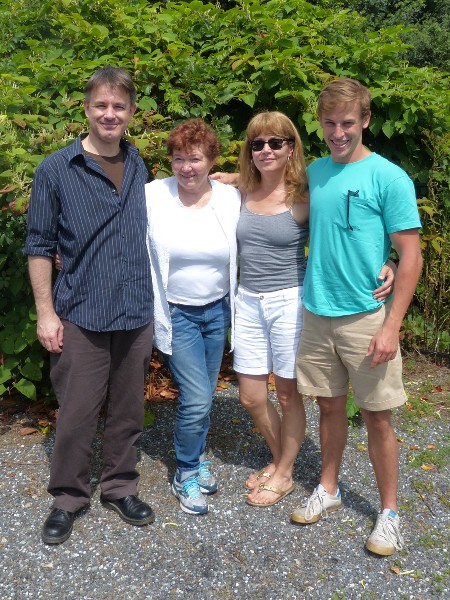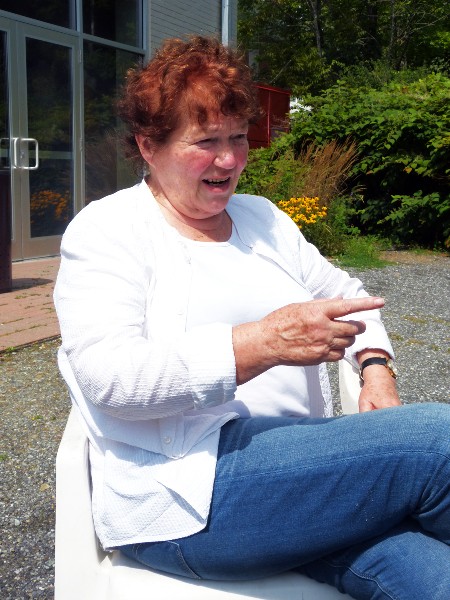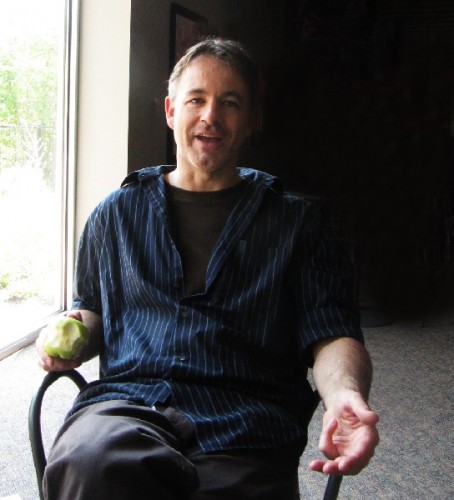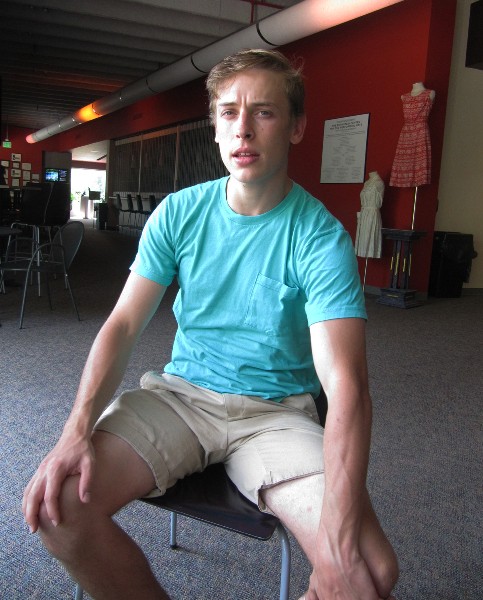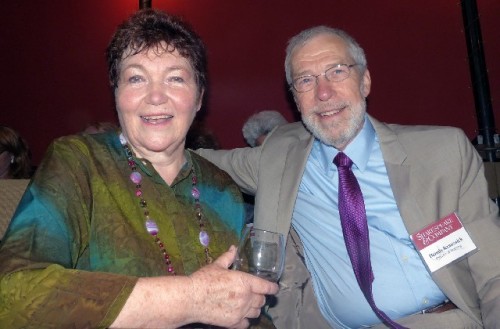Meeting with the Beauty Queens of Leenane
Rocking the Boat at Shakespeare & Company Part One
By: Charles Giuliano - Aug 29, 2013
Through September 15 Shakespeare & Company is presenting the powerful play Beauty Queen of Leenane by Martin McDonagh.
We met at noon for a dialogue with founding artistic director, Tina Packer, long term artistic associate, Elizabeth Aspenlieder, and the actors David Sedgwick and Edmund Donovan who are appearing with the company for the first time.
Packer has been quoted in the media about how she can't wait to end performances of a play she was talked into through a commitment to Aspenlieder.
The hour long dialogue was underway when she joined us after about fifteen minutes. That totally changed the momentum and ambiance. Goaded and provoked about her published remarks Parker exploded with responses that were very personal, deeply felt, and utterly fascinating.
This is part one of a lively, over the top meeting.
Charles Giuliano Edmund (Ray Dooley) was talking about keeping it fresh with slight changes for each performance.
Edmund Donovan David (Sedgwick who plays Pato Dooley) and I were talking about this the other night. How easy it is to fall into a pattern or mentality within a performance. To go into a lazy mode and autopilot. Move over to the stove or take the thing like the night before.
CG (Aggressive accusation) Why did you let her (Mag Folan played by Tina Packer) take the letter? Your brother told you to only put it into the hands of Maureen (Folan played by Elizabeth Aspnlieder). You drove the audience crazy. (laughter) The audience was saying to you “Don’t do it.”
ED I can’t listen to you guys. Whether you think you’re in the play or not.
David Sedgwick The audience was talking during your show?
ED That happens a lot of times. Because I don’t care enough (about delivering the letter directly to Maureen) and I have other things to do. I have a comfortable place at home to sit on my couch. I can smoke and drink my beer. Maybe a friend will come over.
CG So this is your back story.
ED Yeah. This is all the stuff I think he likes to do.
CG Does the director (Matthew Penn) walk you through that or do you sort that on our own?
ED In this case I sorted it on my own.
DS Some director are into back stories and some are very leery of it. Some actors will create back stories which don’t jibe with the play if you get into it. But Matt is very interested in what’s happening in the moment of performance. He wants to see what you’re going to do with the script and the moments which are on stage. He’ll let you work with whatever backstory you want as long as it doesn’t interfere with the play.
ED One of the things that Matt did speak to you and I about was our relationship as brothers. It’s only the things I felt were missing in the play that directly impacted the action. For example our relationship as brothers which is not seen at all in the play.
DS We talked about that relationship in terms of why Pato asks Ray to deliver the letter and what is Ray’s struggle to try to follow his instructions correctly. Ray has the best of intentions but McDonagh (the playwright) sets up so many obstacles to his doing the job. She (Mag) is being so manipulative and demanding. It’s so boring (waiting for Maureen to come home) that he can’t handle it. During talk backs people have speculated about what’s going on in Ray’s head. Is he a benevolent character or sort of evil? People speculate that perhaps he is lying in the final scene. That the train really did happen and she isn’t imagining it. He’s lying about that as revenge even before he gets back the skitterball (which she took away from Ray some years ago ).
ED It’s a testament I think to the writing. McDonagh has led the audience along the protagonist plot line and can’t stomach the hook at the end that she’s a loon. This person you’ve come to love and have been rooting for.
CG I didn’t like the play. The idea or like or not like is not a part of my critical vocabulary. I found the play horrific. It’s a very tough experience for the audience. This is a take no prisoners play. Can you address that?
DS Several people have told me that.
ED You don’t regret experiencing the play?
CG Absolutely not.
ED You just experienced negative feelings.
CG Not negative. I'm trying to say it's not about like or not like. That’s too mundane. What I’m saying is that this is a very tough evening of theatre. I’m asking about your side of the footlights. These are very dark characters. What is your motivation? What are you giving to the audience? What is your gift to us?
DS One answer to that. One reaction to what we are talking about, the audience talking to Ray and begging him across the fourth wall, don’t leave the letter. You can’t trust her. Investing so strongly in it even temporarily. It’s not often that you see a piece of theatre where the engagement is that strong. That you’re actually talking to the actors. Of course not everybody does that. But everyone is feeling something like that inside. People are thinking I hope he waits and that she comes back soon. That I think is a big part of what we’re giving the audience. It’s such a lovely experience to be so invested in a fictional story. You know it’s not real
ED Exactly.
DS But then you don’t get the nice happy ending. When I was a college student I used to listen to Mozart’s Requiem on the headphones for hours. You willfully experience things that make you sad. They’re beautiful sometimes. If we do our jobs right the audience is engaging in that reality.
I’ve had several people tell me, who haven’t seen this production, but have seen it before, or have read it, and say I can’t see that play. There are too many associations in my own life. Or my history, or McDonagh in general. People have seen his other plays like The Pillow Man and they say, no, I can’t see his stuff.
ED It’s hard to play something with purposeful violence. It takes some extra thinking, perhaps, to say why is there scull bashing and torture in the play? Is that necessary to fulfill the questions and points that McDonagh was positing. I’m still in dialogue on that question.
CG You’re a relatively young guy. What makes you so profound? (laughter)
ED Boston.
Elizabeth Aspenlieder (Joining the dialogue with a brogue) Boston. It does have a nice ring to it.
CG You have a mature outlook. How old are you?
ED I turned 23 three days ago. I have my lucky moments that’s all it is.
EA Commenting on the violence I was just rereading Dr. Jim Gilligan’s book Violence. He’s a criminal psychologist. He works with the criminally insane. There’s 70% of his clients (former director of Bridgewater State Hospital for the Criminally Insane) that are in psychiatric prison institutions because of violence within the family. The violence in the show is palpable. It’s not talked about but happens within families all the time.
In 2003 we were doing Lear. We were trying to figure out how to do the eyes. The eye gouging. I was playing Reagan and my husband was Cornwall. I was reading about a young man who was abusing his father and bit his eyes out. That’s what we put into the play. Tina’s production of Lear.
CG (Addressing Tina Packer who joined the dialogue) I wanted to talk to you about these fine new young men joining the company for the summer.
Tina Packer They’re terrific. They’re very sexual figures. We love them. (laughter) Getting into even more trouble with our PR department. Sorry just couldn’t resist it Charles.
CG Oh please you horny old broad. (laughter)
TP (Strongly protesting) You try living in that little cottage year after year with a daughter who’s also horny as hell. (laughter) I finally get Ray in my grasp.
EA We think that Mag and Ray have secretly had this long ongoing affair. Behind the chicken coop. There’s something going on back there.
CG On stage we see a mother/ daughter relationship which is very true to life. Mag is 70 something. I’m 72 and I believe we are about the same age.
TP I don’t think we are Charles. I think you’ve got a decade on me. (Tina mischievously laughs)
EA (Backing up the story) Tina’s in her mid 60s. 62 I believe. (Tina laughs evidently enjoying the stunt).
TP (Laughing confesses) It’s my perpetual lie.
CG It’s ironic that the play casts you as being seventy something.
TP Which I don’t like.
CG The daughter is 40. Which is accurate. So that casting seems fairly realistic. Doing the math if the daughter is forty and your character is 70 then she conceived at 30. Over dinner with friends last night we were discussing how late a woman can conceive. It was brought up that a woman in her 60s had twins and died a couple of years later. Am I assuming Maureen is the youngest of the daughters?
TP Yes. In my book she is. There’s no textual information.
EA There’s three girls.
CG In the review I discussed a tradition in which the youngest daughter gets indentured to care for the parents. Like the Mexican film Like Water for Chocolate. The youngest daughter gets indentured as the care provider.
EA It happens all the time. I’m the youngest of five. In real life. I lived out of the country (Canada) so I wasn’t the immediate care taker. I always felt that bond.
TP I think the two oldest daughters just pushed off. (in the play) The two oldest daughthers are closest in age and Maureen comes ten years later kind of thing. They pushed off at the earliest age.
CG Pushed off?
TP Left home. Got married as fast as they could. They had each other where Lizzie’s character doesn’t have a friend. So it’s easier for her to be indentured.
CG Coming back to the mother daughter relationship you have been here now some 18 years and have often told me that Tina is one of the primary reasons why you have stayed with S&Co. for such a long time.
EA Absolutely.
CG You have worked together and Tina has directed you but in all that time this is the first time that you are on stage together. Which is surprising. Now we have new siblings in the family, David and Edmund. So let’s talk about the familial aspects of the company. Discuss the nurturing and artistic growth that goes on in the company over the course of years.
EA In this play as it is settled on stage and off stage we have known each other for a long time. These two (males) on stage characters are neighbors. They’re not a part of the family. They’re new so I never knew them. As I say to Pato why have no more than two words passed between us in twenty years? Ray I know but I don’t talk to anybody. It’s great having David and Edmund out there. The sense of truth is very palpable because it’s accurate.
CG Let’s talk about the S&Co. family.
TP How do people become members of S&Co.? In many ways it’s self selection. They start working for us. Most of the young people come in through the workshops. These are two of the exceptions. Actually, there’s a lot of exceptions this summer. Usually there’s never more than one or two people. They come in through the workshops, the month long intensives and the education programs.
Most of the people in the education programs have done the month long intensives. If not once then twice or three times. That’s the bedrock of who we are. The training that we do. Especially as far as Shakespeare is concerned. Modern plays are slightly different. Our mission statement is to do social, political modern plays with language at their center. Which is basically what Shakespeare as a young playwright was about with language at the center. There’s a discussion or debate and it’s of a social or political nature. So they come in that way. Depending on who they are they start working their way up. Whether they come in at a higher level because they’re more experienced. Or they come in as teachers. So there’s a lot of ways that people get into the company. Education artists are invaluable to us. A lot of them stay for much of the year. They go out on the road. We need at least 22 of them for the high school program.
CG Are we going to see these fine gentlemen again?
TP I don’t know he (Edmund) seems to have a really blossoming career. You should ask him about that. He came to us through Allyn Burrows who is one of our long term company members. He was taught by Paula Langton who is another long term company member. Edmund came to us although he auditioned like everybody else. David came to us via another long term company member Nicole Richiardi. When we send out casting calls the tom toms start going.
EA Nicole directed Cassandra Speaks last summer.
DS She’s assistant director on Richard II this year.
EA That’s right.
CG Going back to the notion of family in this play. There’s a lot of my Irish heritage and a bit too much of my own mother that I see in you.
TP Bloody hell.
CG How do we look at families? Do they stagnate into fixed attitudes and roles? My mother, for example, never treated me as an adult. We aged together but the relationship never really changed. In later years I would spend holidays with her in Florida. The first day or two was glorious then it devolved into the old pattern with her ordering me about as Mag does. I was for the rest of the time her chauffeur and errand boy. How does a family grow and progress. Can the roles develop and change? (To Elizabeth) Would you have remained for now almost two decades had there not been incentives and opportunities for growth? (To Tina) You have been quoted in the media saying “I can’t wait for this play to be over. To get rid of the damned play that I hate.” (laughter)
EA She said that.
CG I’ve read that you have hated doing it. They clobbered you over the head and you’ve hated every minute of it. In my review, which you haven’t read, I called you the “silver tongued Tina Packer” spewing out that damned garbled brogue that who the hell knows where it’s from. (laughter)
TP It’s somewhere around Liverpool. (laughter) When I read the part last year my visceral response was I don't like doing this. She's a woman who destroys her daughter and in the end gets paid out for it.
CG One might say that if you don’t take on these challenges the company doesn’t grow and actors don’t stay around. Putting on such a tough and demanding play is a testament to the ambition and growth of the company.
TP In my personal life I have dealt with women who have tried to destory their grown children. I want to say one thing about hating to play this role. Charles. I inhabit that woman. Which is why I fucking hate it. I hate playing that woman because I become the person I'm playing. That's acting and I have to live in that world. In building this drama McDonogh drew on stories from his aunts. In a similar way I drew upon my extended family. The way they used illness in order to control or be looked after by other people. Through McDonogh's text you get the pattern of thinking that your character has. As the role evolves you adopt this pattern of thinking and put it into your body. The thinking and feeling begin to take over your whole being. That's how you build the character. You internalise the thinking. Mag Folan is in pain so Tina is in pain. My body hurts and I'm so rigid, my knees are locked, my hands are stiff, she's in physical pain. After two hours of being in that position I'm in pain. I'm controlling everything through my body. It takes a huge act of concetration as you go into unconscious layers of your mind.
CG Why did you do this fucking play?
TP (Roaring and pointing to Elizabeth) Because of her. And my friendship with her. SHE wanted to do it. SHE wanted to do it. (agitated) I did my best to say that Lizzie Ingram or someone else should play it.
EA (emphasis) But you’re SO good.
TP She kept on at me and I thought, well, I owe Lizzie a few so I better get my act together and do it.
CG Are you glad you did the play?
TP I am glad I did the play. But that doesn’t mean it isn’t misery living inside Mag's scull for two hours. It tis. It comes over me about three in the afternoon for a performance at 8:30 PM.
CG It’s just acting.
TP You can say it’s just acting if you like but whatever my process it's living the character. (laughing). The only time I nearly came out of it was when Edmund was literally pulling his hair out on stage (laughing) That’s the only thing that nearly brought me out of it.

